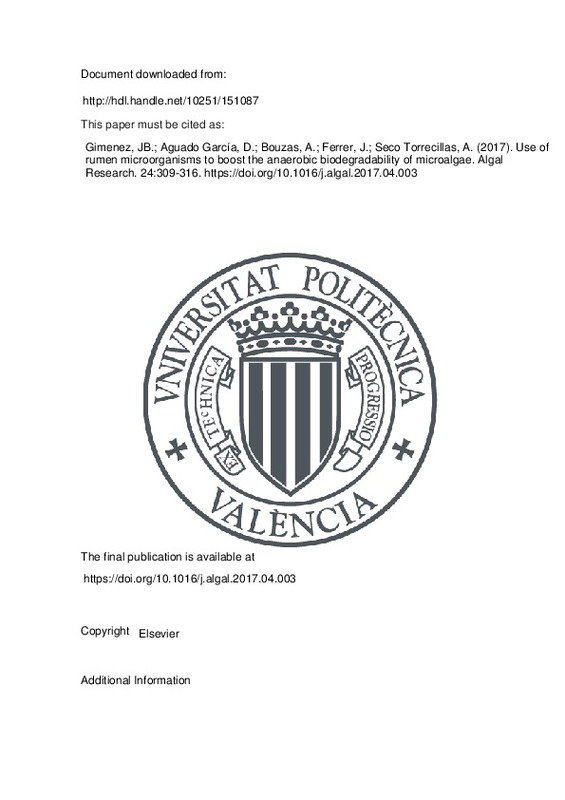JavaScript is disabled for your browser. Some features of this site may not work without it.
Buscar en RiuNet
Listar
Mi cuenta
Estadísticas
Ayuda RiuNet
Admin. UPV
Use of rumen microorganisms to boost the anaerobic biodegradability of microalgae
Mostrar el registro sencillo del ítem
Ficheros en el ítem
| dc.contributor.author | Gimenez, Juan B.
|
es_ES |
| dc.contributor.author | Aguado García, Daniel
|
es_ES |
| dc.contributor.author | Bouzas, Alberto
|
es_ES |
| dc.contributor.author | FERRER, J.
|
es_ES |
| dc.contributor.author | SECO TORRECILLAS, AURORA
|
es_ES |
| dc.date.accessioned | 2020-10-05T06:47:20Z | |
| dc.date.available | 2020-10-05T06:47:20Z | |
| dc.date.issued | 2017-06 | es_ES |
| dc.identifier.uri | http://hdl.handle.net/10251/151087 | |
| dc.description.abstract | [EN] A laboratory bioreactor using rumen microorganisms to treat Scenedesmus spp. biomass was operated for 190 days. At first the bioreactor operated as a Rumen-like Fermenter (RF) with a Sludge Retention Time (SRT) of 7 days. The RF was subsequently transformed into an anaerobic digestion system including two configurations: continuously-stirred tank reactor and anaerobic membrane bioreactor in which different SRT values of up to 100 days were assessed. Methane production peaked at 214 mL CH4 g−1 CODIn with a SRT of 100 days. COD removal and BDP peaked at above 70% and 60%, respectively, at the highest SRT, with no pre-treatment prior to microalgae digestion. The waste sludge production dropped to 0.133 mg VSS mg−1 CODIn after a SRT of 100 days. | es_ES |
| dc.description.sponsorship | This work was funded by the Spanish Ministry of Economy and Competitiveness with the support from the European Commission through the European Regional Development Funds (MINECO, CTM2011-28595-C02-01 and CTM2011-28595-C02-02), which are gratefully acknowledged. The authors would also express their gratitude to the Education, Invetigation, Culture and Sports Council from the Valencian Generality for the Post-Doctoral fellowship awarded to Juan Bautista Gimenez Garcia (APOSTD/2016/104). The authors are thankful to Ion Perez Baena (Universitat Politecnica de Valencia, Institut de Ciencia i Tecnologia Animal) for kindly providing the ruminal fluid used in this study. | es_ES |
| dc.language | Inglés | es_ES |
| dc.publisher | Elsevier | es_ES |
| dc.relation.ispartof | Algal Research | es_ES |
| dc.rights | Reserva de todos los derechos | es_ES |
| dc.subject | Rumen microorganisms | es_ES |
| dc.subject | Microalgae | es_ES |
| dc.subject | AnMBR | es_ES |
| dc.subject | Waste sludge production | es_ES |
| dc.subject | Biodegradability potential | es_ES |
| dc.subject.classification | TECNOLOGIA DEL MEDIO AMBIENTE | es_ES |
| dc.title | Use of rumen microorganisms to boost the anaerobic biodegradability of microalgae | es_ES |
| dc.type | Artículo | es_ES |
| dc.identifier.doi | 10.1016/j.algal.2017.04.003 | es_ES |
| dc.relation.projectID | info:eu-repo/grantAgreement/GVA//APOSTD%2F2016%2F104/ | es_ES |
| dc.relation.projectID | info:eu-repo/grantAgreement/MICINN//CTM2011-28595-C02-01/ES/MODELACION Y CONTROL DE LA RECUPERACION COMO BIOGAS DE LA ENERGIA DE LA MATERIA ORGANICA Y NUTRIENTES DEL AGUA RESIDUAL, ACOPLANDO UN ANBRM Y UN CULTIVO DE MICROALGAS/ | es_ES |
| dc.rights.accessRights | Abierto | es_ES |
| dc.contributor.affiliation | Universitat Politècnica de València. Departamento de Ingeniería Hidráulica y Medio Ambiente - Departament d'Enginyeria Hidràulica i Medi Ambient | es_ES |
| dc.description.bibliographicCitation | Gimenez, JB.; Aguado García, D.; Bouzas, A.; Ferrer, J.; Seco Torrecillas, A. (2017). Use of rumen microorganisms to boost the anaerobic biodegradability of microalgae. Algal Research. 24:309-316. https://doi.org/10.1016/j.algal.2017.04.003 | es_ES |
| dc.description.accrualMethod | S | es_ES |
| dc.relation.publisherversion | https://doi.org/10.1016/j.algal.2017.04.003 | es_ES |
| dc.description.upvformatpinicio | 309 | es_ES |
| dc.description.upvformatpfin | 316 | es_ES |
| dc.type.version | info:eu-repo/semantics/publishedVersion | es_ES |
| dc.description.volume | 24 | es_ES |
| dc.identifier.eissn | 2211-9264 | es_ES |
| dc.relation.pasarela | S\336934 | es_ES |
| dc.contributor.funder | Generalitat Valenciana | es_ES |
| dc.contributor.funder | Ministerio de Ciencia e Innovación | es_ES |







![[Cerrado]](/themes/UPV/images/candado.png)

